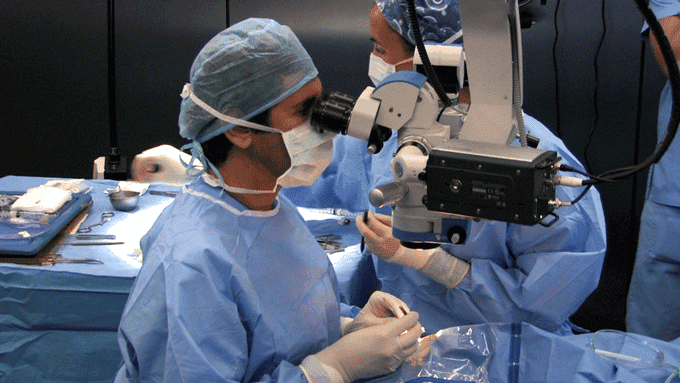
What does it involve?
Amniotic membrane transplantation consists of applying a piece of amniotic membrane to the surface of the eye. This piece is usually attached to the tissue by means of fine sutures. There are two different methods of application, depending on the type of injury: dressing or graft.
If there is only one defect in the epithelium (the outermost layer of the cornea or conjunctiva), but the stroma (the layer underneath) is healthy, the amniotic membrane is used as a dressing that covers the entire surface. The growth factors that the membrane contains cause the epithelial cells to begin to grow underneath it. After a few days, the membrane can be easily removed in the doctor’s surgery, leaving no traces.
The amniotic membrane triggers a rapid wound healing process that can last between 2 and 15 days, depending on the eye condition that is being treated.
In cases of deeper injury involving loss of the stroma, the membrane is grafted, filling the gap left by the missing stroma. With this method, the cells do not grow underneath, as is the case when the dressing is placed on the epithelium, but do so on top, until the membrane, which gradually becomes absorbed, is replaced. Grafting involves a slower healing process with the membrane taking several months to be absorbed. During this time, the amniotic membrane can make the eye opaque, which temporarily limits vision.
When is it carried out?
Amniotic membrane transplantation is particularly indicated for acute-phase burns caused by caustic substances, such as bleach and lime, in which tissue is devitalised, inflamed or is encountering regeneration problems.
It is also often used after extensive conjunctival resection (generally the removal of tumours or scarring), as well as for ulcers and corneal and conjunctival epithelial defects.
It can also be used to increase the chances of success in some corneal surgery, such as corneal transplantation, and in cases where postoperative problems of tissue regeneration or scarring are anticipated.
Prior examination
A comprehensive eye examination.
Before the surgery
The preservation of tissue should always be carried out in an approved tissue bank and basically consists of washing the placenta in an antibiotic solution. In addition to providing written permission, the donor mother must also undergo serological tests to ensure that she is not suffering from any transmissible infectious diseases. These tests are performed by an officially approved tissue bank.
Surgery
This treatment can also be used to increase the chances of success in some corneal surgery, such as corneal transplantation, and in cases where postoperative problems of tissue regeneration or scarring are anticipated.
Risks
This procedure can lead to the onset of inflammatory and rejection processes.
Associated pathologies
Experts performing this treatment
IMO Institute of Ocular Microsurgery
Josep María Lladó, 3
08035 Barcelona
Phone: (+34) 934 000 700
E-mail: international@imo.es
See map on Google Maps
By car
GPS navigator coordinates:
41º 24’ 38” N – 02º 07’ 29” E
Exit 7 of the Ronda de Dalt (mountain side). The clinic has a car park with more than 200 parking spaces.
By bus
Autobus H2: Rotonda de Bellesguard, parada 1540
Autobus 196: Josep Maria Lladó-Bellesguard, parada 3191
Autobuses H2, 123, 196: Ronda de Dalt – Bellesguard, parada 0071
How to arrive at IMO from:
IMO Madrid
C/ Valle de Pinares Llanos, 3
28035 Madrid
Phone: (+34) 910 783 783
See map in Google Maps
Public transport
Metro Lacoma (líne 7)
Autobuses:
- Lines 49 & 64, stop “Senda del Infante”
- Line N21, stop “Metro Lacoma”
Timetables
Patient care:
Monday to Friday, 8 a.m. to 9 p.m.
IMO Andorra
Av. de les Nacions Unides, 17
AD700 Escaldes-Engordany, Andorra
Phone: (+376) 688 55 44
See map in Google Maps
IMO Manresa
C/ Carrasco i Formiguera, 33 (Baixos)
08242 – Manresa
Tel: (+34) 938 749 160
See map in Google Maps
Public transport
FGC. Line R5 & R50 direction Manresa. Station/Stop: Baixador de Manresa
Timetables
Monday to Friday, 09:00 A.M – 07:00 PM





